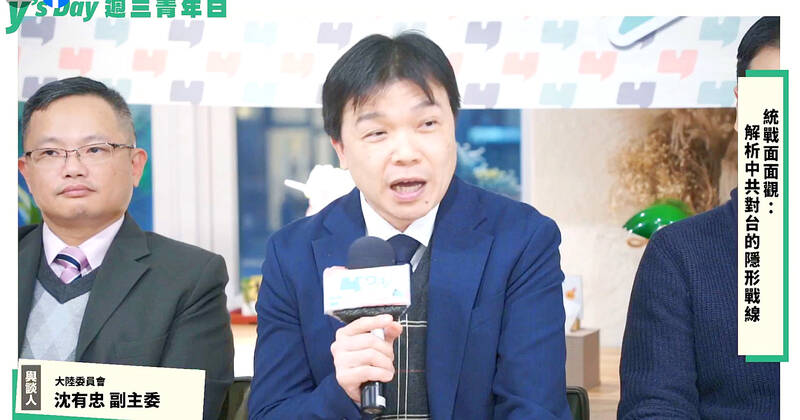Cross-strait interaction is becoming increasingly unilateral, with China treating any interaction as an opportunity to advance its “united front” rhetoric, Mainland Affairs Council Deputy Minister Shen You-chung (沈有忠) said yesterday at the Y’s Day Forum held by the Taiwan Public Welfare group.
The Chinese Communist Party’s (CCP) “united front” strategy includes manipulating local elections, as evidenced in 2018 and 2022, and attempts to diminish the efficiency of the administration through legislative red tape.
While there were visible CCP influences in the legislature affecting cross-strait interaction, such issues were also tied to the ideologies of Taiwanese political parties, Shen said.

Photo: Screen grab from a livestream
Shen cited Kinmen County as a sign that the CCP is strengthening its influence on local governments.
The CCP hopes to use Kinmen to rekindle support for its “one country, two systems” framework, as the credibility of the concept tanked after China’s blatant intervention in Hong Kong, Shen said.
The CCP is mulling the possibility of allowing Kinmen residents to purchase real estate in Xiamen and giving them voting rights, forming a de facto “one country, two systems” template, Shen said, adding that the Kinmen-Xiamen card, and increased convenience of travel and shopping in Xiamen have benefited the “united front” strategy in Kinmen.
The idea is to create a belief that if Kinmen could achieve prosperity from Chinese benefits, there is no reason why Taiwan as a whole could not, Shen said.
Beijing is also stepping up its efforts to win over the hearts and minds of young Taiwanese, providing many benefits for Taiwanese to start businesses in China, Shen said.
However, it is a honey trap, he added.
China has high unemployment rates and offering benefits to Taiwanese at such a juncture suggests an ulterior motive, such as allowing Taiwanese to introduce business start-up models and later forcing them out with cutthroat pricing, Shen said.
Additionally, despite China’s known atheism, it continues to manipulate religion as a tool to conduct “united front” rhetoric, Shen said.
The CCP says that all Matsu temples in Taiwan originated from the original temple in Meizhou, in China’s Fujian Province, and that all temples should visit the original temple once and obtain a certificate that shows that their temple is a “certified and legal” Matsu temple, Shen said.
The process could be applied to the worship of Guangong (關公) or other deities, Shen added.
The council said that cross-strait interactions should not deviate from approved actions in Taiwan, there should be no promotion of political views or denigration of Taiwan, and that visiting Chinese officials should not accept media interviews.

‘DENIAL DEFENSE’: The US would increase its military presence with uncrewed ships, and submarines, while boosting defense in the Indo-Pacific, a Pete Hegseth memo said The US is reorienting its military strategy to focus primarily on deterring a potential Chinese invasion of Taiwan, a memo signed by US Secretary of Defense Pete Hegseth showed. The memo also called on Taiwan to increase its defense spending. The document, known as the “Interim National Defense Strategic Guidance,” was distributed this month and detailed the national defense plans of US President Donald Trump’s administration, an article in the Washington Post said on Saturday. It outlines how the US can prepare for a potential war with China and defend itself from threats in the “near abroad,” including Greenland and the Panama

The Chinese Nationalist Party (KMT) is maintaining close ties with Beijing, the Democratic Progressive Party (DPP) said yesterday, hours after a new round of Chinese military drills in the Taiwan Strait began. Political parties in a democracy have a responsibility to be loyal to the nation and defend its sovereignty, DPP spokesman Justin Wu (吳崢) told a news conference in Taipei. His comments came hours after Beijing announced via Chinese state media that the Chinese People’s Liberation Army’s Eastern Theater Command was holding large-scale drills simulating a multi-pronged attack on Taiwan. Contrary to the KMT’s claims that it is staunchly anti-communist, KMT Deputy

RESPONSE: The government would investigate incidents of Taiwanese entertainers in China promoting CCP propaganda online in contravention of the law, the source said Taiwanese entertainers living in China who are found to have contravened cross-strait regulations or collaborated with the Chinese Communist Party (CCP) could be subject to fines, a source said on Sunday. Several Taiwanese entertainers have posted on the social media platform Sina Weibo saying that Taiwan “must be returned” to China, and sharing news articles from Chinese state media. In response, the Mainland Affairs Council (MAC) has asked the Ministry of Culture to investigate whether the entertainers had contravened any laws, and asked for them to be questioned upon their return to Taiwan, an official familiar with the matter said. To curb repeated

Taiwan People’s Party (TPP) Chairman Huang Kuo-chang (黃國昌) yesterday appealed to the authorities to release former Taipei mayor Ko Wen-je (柯文哲) from pretrial detention amid conflicting reports about his health. The TPP at a news conference on Thursday said that Ko should be released to a hospital for treatment, adding that he has blood in his urine and had spells of pain and nausea followed by vomiting over the past three months. Hsieh Yen-yau (謝炎堯), a retired professor of internal medicine and Ko’s former teacher, said that Ko’s symptoms aligned with gallstones, kidney inflammation and potentially dangerous heart conditions. Ko, charged with